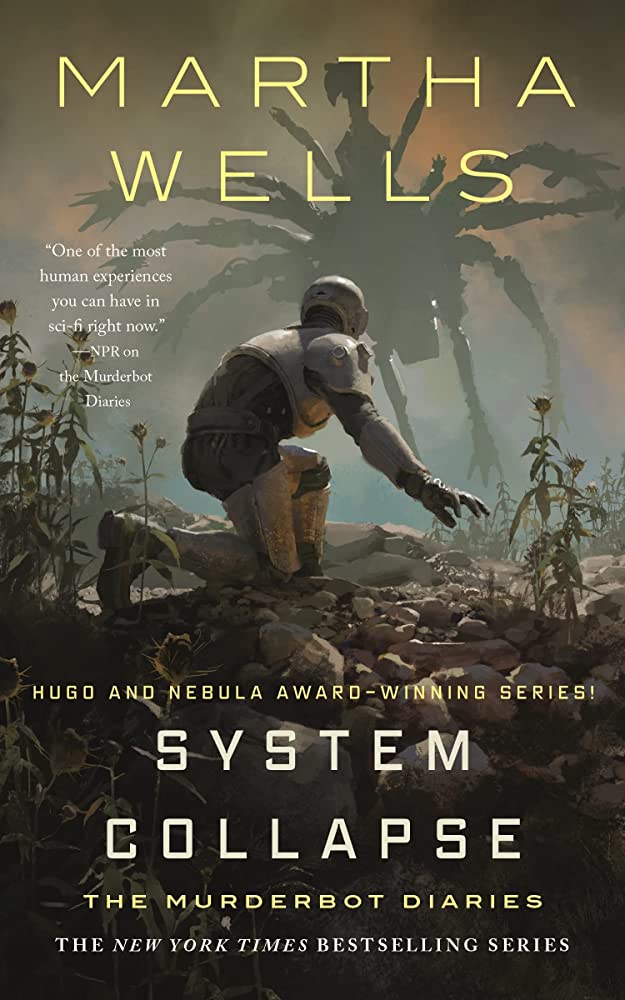Oh, Murderbot. Truly you are the avatar of our age, unwilling though you may be to serve as a representative of anything human. Less an antihero than an anti-everything-up-to-and-including-heroes, Murderbot is once again in fine form for this seventh installation of its* anti-corporate adventures. Only this time, in Martha Wells’ System Collapse, the corporate system under threat might be its own.
Set immediately after the events of Network Effect, Murderbot is dealing with the consequences of (1) alien contamination, (2) historical corporate screwups, (3) present-day corporate screwups, (4) humans in peril (general), (5) its humans in peril (specific), (6) its starship colleague (emphatically not its friend) in peril, and therefore (6§A) its colleague’s humans in peril, (7) killer robots, and finally (8) having to be on a planet (ew). All of this has been extremely traumatizing, and furthermore, has left it with very little time to enjoy its singular and all-consuming hobby, which is watching media content.
All of this is already a lot, but the fallout keeps getting more complicated. There’s a corporation angling for access to the alien-infected planet (see 1, 8), and they also want to trick the humans who live there into perpetual indenture (see 4). Wells’ vision of the future is bleak but not unrealistic, and it’s enormously satisfying to see Murderbot and its humans trying to thwart corporate lackeys who keep putting profits over people. This requires Murderbot & Pals to undertake a delicate balancing act of espionage, legal wrangling, and hostile negotiations—a balancing act that Murderbot is, for the first time, having trouble managing. Even with its advanced processing capacity and threat assessment software, it’s beginning to miss things. It’s not just depressed, it’s distracted. But it most definitely doesn’t want to talk about the [redacted] event. No. Not even a little bit.
Unfortunately, it may not have a choice. The corporate agents are clever and have no scruples; and worse, Murderbot’s colleagues (not friends) are even more relentless in their concern and affection. The solution to both these problems may actually be one and the same, but only if Murderbot can push a little further outside its boundaries than ever before.
The longer a series goes on, the harder it is to find the balance between the elements that made the series work in the first place and the kinds of natural development that happen to characters and settings over time. That all-important quality, novelty (pun not intended but hey, if it works), provides exponentially diminishing returns the longer it continues, but authors can’t introduce too much newness or they risk alienating (I’m not doing this on purpose) their readership. The tricky bit is identifying exactly what’s essential and what can evolve.

Wells has, however, learned the lessons of the comfort shows Murderbot itself is so reliant on. What’s so craveable about these books, just like the nth re-watch of Parks and Rec or Brooklyn 99, is the persistence of archetype. Murderbot, like Ron Swanson or Rosa Diaz, embodies a slightly larger-than-life ideal. What’s human about them can change; what’s essential about them—the social reticence, the unfailing competence, etc.—remains reliably the same.
Wells is doing a top-notch job at this multi-axis balancing act, not changing Murderbot’s essentially sulky outlook but definitely letting it evolve. That acerbic, put-upon voice never goes away, even though we are increasingly aware that the parameters of Murderbot’s contempt have changed based on its experiences.
“Realistic” is not a criterion I like to apply too stringently to a series about far-future interstellar corporate battles, or to a cyborg protagonist. But for what it’s worth, there is a lot of realism to Murderbot’s ongoing anxiety and depression. Wells handles Murderbot’s inner struggles with great thoughtfulness, blending a natural empathy for the character with a brutally indifferent confidence in the plot. Murderbot is having issues? Too bad, the action doesn’t stop!
Neither does the innovation, which is another major factor in keeping a series fresh. Wells doesn’t just find new set pieces to up the ante, she makes sure any solutions—whether violence, subterfuge, or otherwise—are grounded in the characters’ development while still leaving room for them to be their badass selves.
System Collapse continues to deliver on the series’ key draws, and on top of that, it has important things to say about the way art and friendship really can fight capitalist dystopia—and I do mean fight. Murderbot, in spite of and because of the [redacted], is the kind of hero it never wanted to be, a hero we definitely don’t deserve, and the hero we will keep on needing for many more books to come.
System Collapse will be out on November 14, 2023.
*Murderbot uses the pronouns it/its.

I do love Murderbot! But when I started into System Collapse, I worried that it might assume too much familiarity on the part of a reader… But for myself, having read the entire series, it worked beautifully! SPOILER ALERT! I found it ironic that Murderbot is having human problems! Is it perhaps becoming too human?! And, of course, it is having problems acknowledging such…